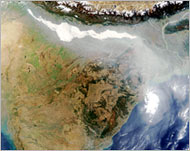India ignores Kyoto demands
India has said it will expand its nuclear industry in an attempt to reduce pollution rather than agree to cuts to greenhouse gases imposed by the Kyoto Protocol.

Speaking after the first meeting of a climate change group created by six of the world’s biggest polluters in Sydney, A Raja, the Indian environment minister, said his country would accept help to reduce emissions but would not be forced into cuts.
“Neither the Kyoto Protocol nor this partnership can stipulate anything upon the government of India to reduce emissions,” he said.
Asia‘s third-largest economy has signed the Kyoto Protocol, which obliges about 40 developed countries to cut their emissions by an average of 5.2 per cent below 1990 levels by 2008-2012. But it is exempt from the mandatory cuts itself because, like China, it is considered a developing nation.
India is also part of the new Asia Pacific Partnership on Clean Development and Climate that met in Sydney. It was joined by China, the US, Australia, South Korea, and Japan. The group hopes to tackle climate change without hindering economic growth.
Own agenda
Environment ministers from around the world agreed in Montreal in December to a plan to extend the Kyoto climate pact beyond 2012 and to start new, open-ended world talks on ways to fight climate change that will include Kyoto outsiders such as the US and developing third-world nations.
But Raja was adamant that India would not agree to binding cuts.
“We are developing countries, we have our own agendas for our development activities, so we cannot give any promise, any commitment to reduce further our emissions,” he said.
 |
|
A satellite image showing a |
The two-day Asia Pacific Partnership gathering ended on Thursday with the participants pledging a multi-million-dollar fund to develop clean energy, but they said fossil fuels would continue to be central to their economies for generations.
India is mainly dependent on coal for its energy, but has about 15 nuclear power plants and is under pressure to increase energy production to meet a furious pace of industrialisation.
Growing problem
In July 2005, the US signed a deal to give India access to nuclear technology, including fuel and reactors, that it had previously been denied for 25 years.
In 2001 only two per cent of India‘s energy demands were satisfied by nuclear energy. A report released by the Australian Bureau of Agriculture and Resource Economics (ABARE) on Thursday forecast this figure to increase to 16 per cent by 2050.
While Indian cities suffer from choking pollution, the country’s per-capita carbon emissions are low, less than a quarter of the world average and many times less than those of the United States.
But ABARE also said India‘s total contribution to global emissions would rise to 9.4 per cent by 2050 from 5.4 per cent in 2001, while its contribution to global emissions from electricity generation would rise to 10.3 per cent by 2050 from 6.2 per cent in 2001.